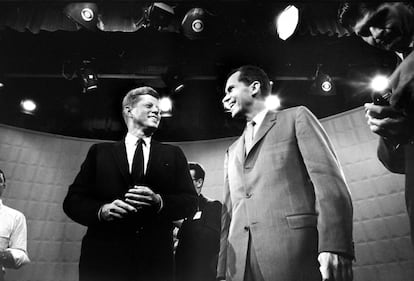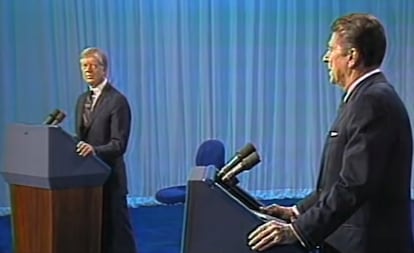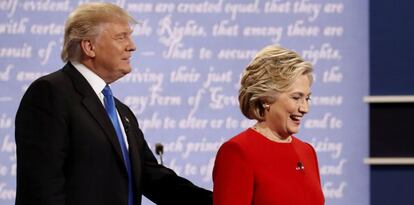Debates that win elections: The most decisive presidential showdowns in US history
From Kennedy against Nixon to Reagan against Carter, some face-offs between candidates have played a key role in determining the outcome of a vote. Will this be the case when Biden faces Trump on Thursday?


Everything lately in the United States is “historic” and “unprecedented.” It is the sign of the times, which is dominated by worn-out adjectives. But, in this case, there is some truth to it. The CNN debate that will pit Joe Biden and Donald Trump against each other on Thursday in Atlanta is the first between two very old rivals (81 and 78, respectively) whose mental fitness is in question; the first between two former presidents; and the first to be held so soon, a little over four months before the November elections, when both candidates are not yet official candidates (this will be announced at the party conventions in July and August).
Traditionally, debates are held a few weeks before the election, but this time they have pushed forward the calendar at Biden’s request, because voting by mail in advance has never been so important. The second debate will take place on September 10. The president is hoping that an early debate will serve to dispel doubts about his fitness for office, which many have questioned, and to remind voters of Trump’s true personality. If everything goes as Biden hopes, the debate could play a crucial role in his re-election campaign. If not, he will still have months to do damage control.
The history of presidential debates in the United States is also the history of television in the country. The first debate that marked an era was also the first that was not exclusively broadcast via radio. It was also the first of a series of debates that are universally accepted to have determined the outcome of the election. This was the 1960 debate that helped John Kennedy sell himself as a promising young leader to American voters, watching the debate from their living rooms.
In front of him was Richard Nixon, Republican candidate and two-time vice president. But Nixon’s failure to understand the language of the new medium (as well as his choice of suit color and refusal to wear makeup) worked against him in the first of the four debates. He learned his lesson, but it was too late: the contrast between their styles tipped the scales for the Democrats.

There were no more debates until 1976, when once again the showdown between the two candidates was decisive. On one side was Republican president Gerald Ford, given the thankless task of rebuilding a country’s broken trust after Nixon’s resignation two years earlier, amid the Watergate scandal. On the other was Jimmy Carter, who was able to embarrass his opponent when he made him say “there is no Soviet domination of Eastern Europe.” The gaffe cost Ford dearly among voters in the swing states of the Midwest, where there is a high percentage of Poles and Czechs.
Carter vs Reagan
Four years later, Carter was this time the victim of his opponent: the old (and mediocre) actor Ronald Reagan offered one of his best performances in his debate with the president, who was running for re-election. Reagan’s TV-friendly face was enough to reassure voters, especially women, who were suspicious of his hawkish profile. The candidate spoke about his family to convince viewers otherwise: “I have seen four wars in my lifetime,” he said. “I’m a father of sons; I have a grandson. I don’t ever want to see another generation of young Americans bleed their lives into sandy beachheads in the Pacific, or rice paddies and jungles in Asia, or the muddy, bloody battlefields of Europe.”

After these first three presidential debates, candidates, advisors and voters took note and none of the debates that followed were so decisive. But they did have their moments. In the 1984 debate, Reagan’s joke about Walter Mondale’s young age made even his opponent laugh. In 1988, the public was shocked by Michael Dukakis emotionless response to whether he would continue to oppose the death penalty if his wife was raped and murdered. In 1992, George Bush Sr. looked at the clock throughout the debate and lost his train of thought. And the 2000 debate was marked by Al Gore’s loud sighs of impatience. He would end up losing the election to George Bush Jr. by just a handful of votes.
Democratic supporters and strategists — who will be anxiously watching the 90-minute Biden-Trump debate on Thursday — are desperately hoping that Biden will once again prevail over Trump, as he did so in the 2020 debate, when he even managed to stop the Republican’s angry interruptions: “Will you shut up, man?”
On Tuesday, Hillary Clinton, the only person who has debated both Trump and Biden — in 2016, against Trump, who promised that he would imprison her if he won the election White House, and eight years earlier, against Biden, in the Democratic primaries — published an opinion piece in The New York Times, in which she shared her advice on what to look out for.
Clinton gave three pieces of advice: pay attention to how the candidates talk about people, not just policies (especially on the crucial issue of abortion); try to see “through the bluster” (especially when it comes to exaggerated remarks about the economy); and think about what is really at stake in this election, which she said described as a choice “between chaos and competence.” She pointed out that Trump has been convicted of 34 felony counts, and argued that Biden “is a wise and decent man.”

Clinton also called on voters not to put theater before politics: “We’re picking a president, not the best actor.” Although that plea, given U.S. culture and the history of presidential debates — which follows rules more fitting of a street fight than of the noble art of rhetoric — seems too big of an ask.
Sign up for our weekly newsletter to get more English-language news coverage from EL PAÍS USA Edition
Tu suscripción se está usando en otro dispositivo
¿Quieres añadir otro usuario a tu suscripción?
Si continúas leyendo en este dispositivo, no se podrá leer en el otro.
FlechaTu suscripción se está usando en otro dispositivo y solo puedes acceder a EL PAÍS desde un dispositivo a la vez.
Si quieres compartir tu cuenta, cambia tu suscripción a la modalidad Premium, así podrás añadir otro usuario. Cada uno accederá con su propia cuenta de email, lo que os permitirá personalizar vuestra experiencia en EL PAÍS.
¿Tienes una suscripción de empresa? Accede aquí para contratar más cuentas.
En el caso de no saber quién está usando tu cuenta, te recomendamos cambiar tu contraseña aquí.
Si decides continuar compartiendo tu cuenta, este mensaje se mostrará en tu dispositivo y en el de la otra persona que está usando tu cuenta de forma indefinida, afectando a tu experiencia de lectura. Puedes consultar aquí los términos y condiciones de la suscripción digital.








































